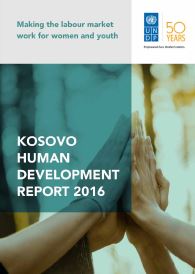
We kindly inform you that, as long as the subject affiliation of our 300.000+ articles is in progress, you might get unsufficient or no results on your third level or second level search. In this case, please broaden your search criteria.


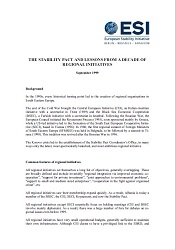
„To be frank, let us note what we can and cannot do. We can advise you on how to improve Bosnia’s ranking within one year. We do not promise that this will actually lead to any more jobs or investment. And yet, it is time for some surprising good news from Bosnia. What the European Commission has asked you to do you can do, and more. And then turn to policies which might actually make a real difference in the long run.“ (from the letter of ESI to the members of the Presidency of Bosnia and Hercegovia)
More...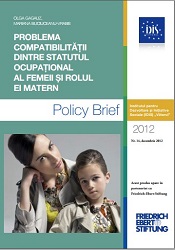
As for the Republic of Moldova, it is seen that high career requirements are listed on a secondary position to the financial problems and shortcomings. According to the research findings, the justification of the own attitude towards professional activity relates primarily to the economic aspect of the family being a source of income for 74.8% of respondents. The pro¬fessional activity becomes a means of self-ful¬fillment and autonomy for 41% and for about 38% - an opportunity to obtain financial inde¬pendence. With the increase in the number of children, through the involvement in the labor field women claim, primarily, the need for a significant additional income to support the family. Rationalizing on the motivation justifying the involvement into the labor market of the woman who has a child of preschool age, about 2/3 of respondents equally emphasize the “financial and material shortcomings”. Much lower, but significant values are assigned to: desire to have the “own” money (about 39%), satisfaction and interest in work (25.7%), and finally, the need to accumulate work experience (23.3%). Without deviating from the upper position assigned to economic problems, with the increase in the level of education of respondents, rises, as well, the share of motivation towards the interest in the job and the desire of financial independence.
More...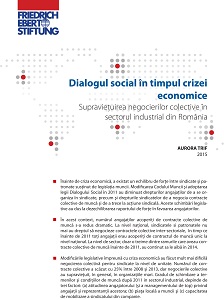
Legislative changes coupled with the economic crisis have made collective bargaining for unions at the unit level much more difficult. The number of collective agreements decreased by 25% between 2008 and 2013, but collective bargaining has generally survived in large organizations. The degree of change in terms and conditions of employment after 2011 in the industrial sector depends on three factors: (a) the attitude of the employer (and top management) towards employees and their representatives; (b) the local labor market; and (c) the ability to mobilize the union in the company.
More...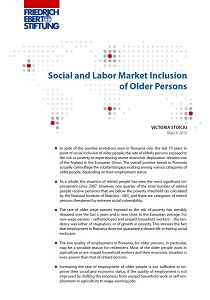
According to the last Romanin census in 2011, the persons aged 65 and over represent 16.1% of total population. A Presidential Committee report es¬timates that the five million persons aged 65 and over will represent, at the middle of the century, 30% of the country’s population, i.e. third times more than in the early 1990s (Presidential Admin-istration, 2009). // Aging is usually associated with a decline in activity or with entering inactivity, with higher depen-dency on healthcare and social services and often with a more precarious economic situation. This has economic implications, as well as an impact on the organization and functioning of society. // This paper is intended as a brief overview of the situation of older persons in Romania. The follow¬ing analysis will focus on the economic and social inclusion status of older persons, as well as on the access of the elderly to the labor market.
More...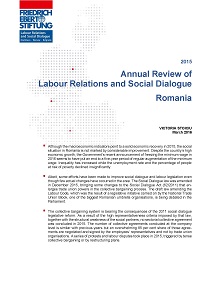
Although the macroeconomic indicators point to a solid economic recovery in 2015, the social situation in Romania is not marked by considerable improvement. Despite the country’s high economic growth, the Government’s recent announcement of freezing the minimum wage in 2016 seems to have put an end to a five-year period of regular augmentation of the minimum wage. Inequality has increased while the unemployment rate and the percentage of people at risk of poverty declined insignificantly. // Albeit, some efforts have been made to improve social dialogue and labour legislation even though few actual changes have occurred in the area. The Social Dialogue law was amended in December 2015, bringing some changes to the Social Dialogue Act (62/2011) that en-larges trade union powers in the collective bargaining process. The draft law amending the Labour Code, which was the result of a legislative initiative carried on by the National Trade Union Block, one of the biggest Romanian umbrella organisations, is being debated in the Parliament.
More...
Ljudska bića koja rade nisu samo „resurs“. To otkriće je jedna odvažnih lekcija krize kroz koju prolazimo. Nega bolesnih; isporuke hrane, lekova i drugih neophodnih potrepština; odnošenje smeća; popunjavanje polica i rad za kasom u supermarketima – to su poslovi koji su nam omogućili da nastavimo da živimo i za vreme pandemije – a radnici koji su ih obavljali pokazali su da rad nije roba kao svaka druga. Zdravlje ljudi i nega najugroženijih ne mogu se prepuštati delovanju samo tržišnih zakona. Ako dopustimo da u takvim oblastima vladaju isključivo tržišni mehanizmi, rizikujemo dalji rast nejednakosti do tačke u kojoj će ona direktno ugroziti živote pripadnika najosetljivijih populacija.
More...
Moja partnerka i ja smo planirale da iz San Franciska odemo u Reno u Nevadi i tamo tri meseca pratimo predizbornu kampanju za predsedničke izbore 2020. Već smo tamo bile 2018. i sarađivale sa sindikatom radnika u ugostiteljstvu (UNITE-HERE), samo što bismo ovoga puta pratile kampanju uklanjanja Donalda Trumpa iz Bele kuće.
More...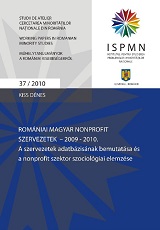
Jelen dolgozatban a romániai magyar civil szervezetek – avagay romániai magyar nonprofit szektor– szociológiai szempontú elemzésére teszünk kísérletet. A dolgozatban két célt követtünk. Egyrésztmegpróbáltunk képet alkotni a szóban forgó szervezeti szféra nagyságáról és területi megoszlásáról, aszervezetek tevékenységek szerinti megoszlásáról, anyagi, humán és infrastrukturális erőforrásokkal valóellátottságáról. Másrészt a romániai magyar nonprofit szektor sajátosságait úgy próbáltuk kimutatni,hogy elhelyeztük azt az európai országok nonprofit szektorainak palettáján. Fő következtetésünk az, hogy az elemzett nonprofit szektor méretében kisebb, mint az a romániai magyar népesség nagyságaalapján indokolt volna; a szektor elsősorban kulturális-közművelődési jellegű feladatok ellátását végzi, miközben fizetett munkaerőt inkább a jóval kisebb számú szolgáltató szervezetekben tud alkalmazni; működésében pedig elsősorban a román és a magyar költségvetési forrásokra, valamint külföldiadományokra támaszkodik.
More...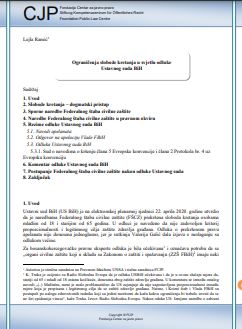
Ustavni sud BiH (US BiH) je na elektronskoj plenarnoj sjednici 22. aprila 2020. godine utvrdio da je naredbama Federalnog štaba civilne zaštite (FŠCZ) prekršena sloboda kretanja osobama mlađim od 18 i starijim od 65 godina. U odluci je navedeno da nije zadovoljen kriterij proporcionalnosti i legitimnog cilja zaštite zdravlja građana. Odluka o prekršenom pravu apelanata nije donesena jednoglasno, jer je sutkinja Valerija Galić dala izjavu o neslaganju sa odlukom većine.
More...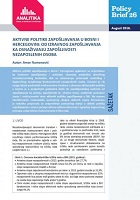
Active labour market policies in Bosnia and Herzegovina are mostly orientated towards direct employment and attempts to manage the consequences of the present socioeconomic context, while the potentials of strategic, long-term strengthening of jobseekers’ competitiveness is being neglected. The main goal of this paper is to present international trends in activation policies, which have recently undergone a paradigm shift from employment to strengthening of employability, and to analyse the present state and institutional framework of active employment policies in BiH. Based on the identified shortcomings of the existing design of active measures, several recommendations are given to improve the field of employment policies by strengthening their active dimension and building a long-term approach to labour market improvements.
More...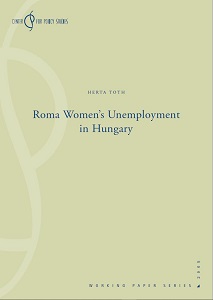
While several recent studies have explored the position of Roma in the labor market in Hungary and across Central Eastern Europe, most fail to integrate gender into their analyses. Responding to this gap, this paper calls attention to the invisibility of Roma women in research projects and publications, despite the fact that they maintain a specific and marginalized position in the labor market. This paper also goes beyond existing studies that reproduce a narrow interpretation of “economy” and “paid work,” by drawing attention to the connection between Roma women’s productive and reproductive roles. Based on a review of existing research and literature, this paper challenges the validity of traditional labor market concepts for understanding and addressing Roma women’s labor market position and employment potential. Analyzing a range of issues surrounding Roma women’s employment, the paper shows strong links between education and economic activity, and between Roma women’s economic activity and the potential for their families to avoid poverty. The study offers a series of recommendations to improve the position of Roma women, as well as that of Roma men, in the labor market in Hungary.
More...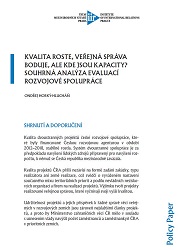
This policy paper provides a comprehensive analysis of the evaluation reports of 35 bilateral development cooperation projects funded by the Czech Development Agency (CzDA) in 2012-2018. The analysis focuses on the descriptive statistics of the evaluation criteria and cross-cutting themes in relation to other aspects of the projects. The paper finds that the quality of the projects has been steadily increasing, especially in the area of public administration, which is a comparative advantage of the Czech Republic as a small donor. However, the paper also identifies the main weaknesses of the projects, such as low sustainability and weak contribution to good governance in the partner countries. The paper argues that these weaknesses are largely due to the insufficient human capacities of the Czech public administration, especially the CzDA and its staff at the embassies. The paper recommends that the Ministry of Foreign Affairs of the Czech Republic should increase the number of staff and financial resources for development evaluations, actively seek and support the capacities of the Czech public administration for technical assistance, and limit the number of sectors and increase the concentration of the Czech development cooperation.
More...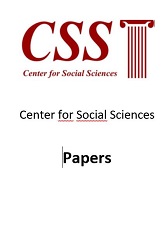
The Objective of the current study was to identify the most demanded expertise on the Khoni labor market. For this purpose, qualitative research method, namely in-depth interviews were utilized. Total of 11 interviews with the local employers from governmental agencies, nongovernmental organizations and private businesses were carried out. Overall, according to the employers, there is a high demand on high as well as low skilled labor force in the municipality. Computer literacy, clerical work and foreign language knowledge was equally underlined as essential by all employers. As for the non-formal education, only those employers whose organization depends on high skilled labor force (production, local municipality administration and healthcare sector, NGOs) allocate certain funds for training their personnel. Taking into account the general market demands on the local labor market, respondents named computer literacy, financial literacy, and foreign languages as the most desirable educational programs for raising the skills of the existing/potential employees.
More...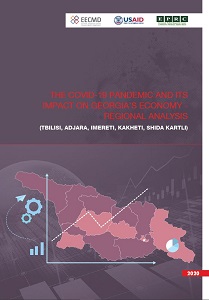
In 2020, the Covid-19 pandemic caused a severe healthcare crisis and brought a devastating impact on the economy. The world, including Georgia, started assessing the scale and scope of damage back in Spring 2020, but by the end of the year, the impact became more explicit and measurable, even on the regional level. Therefore, presented projections and recommendations are more grounded and realistic.
More...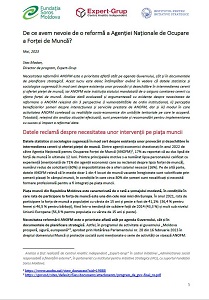
The need to reform ANOFM is a priority both on the Government's agenda and in the strategic planning documents. This is by no means accidental considering that statistical and sociological data definitely suggest the existence of challenges and imbalances in the intermediation of labor market demand and supply, and ANOFM is the state institution mandated to ensure the correlation of labor demand with labor supply. The given analysis evaluates and argues with evidence about the need to reform ANOFM emerging from 3 perspectives i) institutional vulnerabilities, ii) the perception of unemployed beneficiaries about the interaction and services provided by ANOFM, but also iii) how the activity of ANOFM correlates with social realities - economic from the territorial units they cover. At the same time, based on the analysis of the situation carried out, recommendations are also presented for the successful and impactful implementation of the given reform.
More...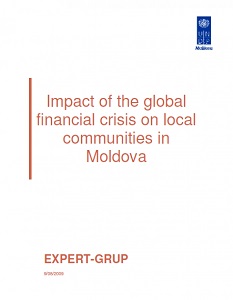
The given study aimed to examine the real causes of informal employment and the impact of informal employment on the state, but also on the people who work in this segment. In this context, special attention has been paid to "undeclared work" and "envelope wages", which are achieved through tax evasion, while other more widespread forms of informal employment (e.g. self-employment or work in own households) are a response to the existing economic structure and legal framework and do not have the primary purpose of tax evasion. However, the imperfect legal framework allows the evasion of paying taxes specifically by practicing some activities as a self-employed person. However, the purpose of this report is to analyze specifically that part of informal employment that involves tax evasion.
More...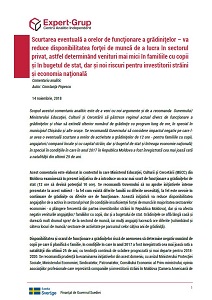
The purpose of this analytical commentary is to come up with new arguments and to recommend to the Government/Ministry of Education, Culture and Research to keep the current diverse operating regime of kindergartens and even expand later the number of kindergartens with a long schedule of hours, especially in the municipality Chisinau and other cities. It is recommended to the Government to consider the negative impact that a possible shortening of the activity hours of kindergartens by 12 hours would have - for families with children, local employers/companies and foreign capital, but also the state budget and the entire national economy; especially in the conditions where in 2017 the lowest birth rate in the last 25 years was recorded in the Republic of Moldova.
More...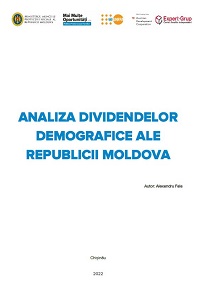
In order to favor economic dynamics, public policies need to address the influences determined by both demographic dividends. For example, in the case of occupational policies, it would be welcome to extend the possibilities of keeping people who have passed the retirement age at work, if the elderly want to continue their activity and their state of health is satisfactory. These measures would increase the labor income of the elderly and reduce the gap between consumption and labor income. At the same time, the period during which adults are net producers would be extended and the number of net producers would increase, which would consequently reduce the effects associated with the loss of the advantages offered by the first demographic dividend. In order to increase the opportunities generated by the second demographic dividend, it is necessary to diversify the possibilities of investing savings, which would favor the accumulation of assets and, implicitly, would increase the capital stock. Another important policy direction concerns the promotion of a broad set of reforms that would boost the return on capital, which would boost economic growth and enhance the benefits of capital accumulation.
More...